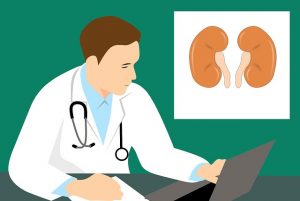Kidney disease is a serious health condition that affects millions of people worldwide. It can have a significant impact on individuals and their families, causing physical, emotional, and financial stress. In this article, we will explore what kidney disease is, how it is diagnosed and treated, the importance of diet and nutrition, managing symptoms, coping with the emotional impact, and resources available for those living with kidney disease.
What is Kidney Disease?
 Kidney disease is a condition in which the kidneys are damaged and cannot function properly. The kidneys are responsible for filtering waste products from the blood and removing excess fluids from the body. When they are damaged, waste products can build up in the blood, leading to a range of health problems.
Kidney disease is a condition in which the kidneys are damaged and cannot function properly. The kidneys are responsible for filtering waste products from the blood and removing excess fluids from the body. When they are damaged, waste products can build up in the blood, leading to a range of health problems.
There are several types of kidney disease, including acute kidney injury (AKI), chronic kidney disease (CKD), polycystic kidney disease (PKD), and glomerulonephritis. AKI is a sudden loss of kidney function that can be caused by injury or illness. CKD is a long-term condition in which the kidneys gradually lose function over time. PKD is an inherited condition in which cysts form on the kidneys, while glomerulonephritis is an inflammation of the kidneys’ filtering units.
Causes and risk factors for kidney disease include high blood pressure, diabetes, heart disease, obesity, smoking, family history of kidney disease, and certain medications.
Diagnosing Kidney Disease
Symptoms of kidney disease may include fatigue, swelling in the legs or feet, changes in urine output or color, nausea or vomiting, and high blood pressure. However, many people with kidney disease may not experience any symptoms until the condition has progressed.
Diagnostic tests for kidney disease may include blood tests to measure levels of creatinine and other waste products in the blood; urine tests to check for protein or blood in the urine; imaging tests such as ultrasound or CT scans; and kidney biopsy, in which a small sample of kidney tissue is removed for examination.
Early detection of kidney disease is important, as it can help prevent further damage to the kidneys and improve outcomes. Regular check-ups with a healthcare provider can help identify kidney disease in its early stages.
Treatment Options for Kidney Disease
Treatment for kidney disease depends on the type and severity of the condition. Medications may be prescribed to control blood pressure, reduce swelling, or treat underlying conditions such as diabetes or infections. Medical interventions such as angioplasty or stenting may be used to improve blood flow to the kidneys.
In more advanced cases of kidney disease, dialysis or kidney transplant may be necessary. Dialysis is a process in which a machine filters waste products from the blood, while a kidney transplant involves replacing a damaged kidney with a healthy one from a donor.
Lifestyle changes such as quitting smoking, maintaining a healthy weight, and exercising regularly can also help manage kidney disease. Self-care practices such as getting enough rest, managing stress, and avoiding alcohol and drugs can also be beneficial.
Diet and Nutrition for Kidney Disease
A kidney-friendly diet is an important part of managing kidney disease. This type of diet focuses on reducing the intake of sodium, potassium, and phosphorus while increasing the intake of protein and fiber.
Foods to avoid on a kidney-friendly diet include processed foods, high-sodium foods such as canned soups and snacks, high-potassium foods such as bananas and potatoes, and high-phosphorus foods such as dairy products and nuts.
Foods that are recommended on a kidney-friendly diet include fresh fruits and vegetables (with some exceptions), lean protein sources such as chicken or fish, whole grains, and low-fat dairy products.
Tips for meal planning and preparation include reading food labels carefully, cooking at home instead of eating out, and using herbs and spices instead of salt to add flavor to meals.
Managing Symptoms of Kidney Disease
Common symptoms of kidney disease include fatigue, swelling, changes in urine output or color, nausea or vomiting, and high blood pressure. Strategies for managing these symptoms may include taking medications as prescribed, following a kidney-friendly diet, getting enough rest, and staying hydrated.
It is important to communicate with a healthcare team about any symptoms or complications related to kidney disease. They can provide guidance on managing symptoms and adjusting treatment plans as needed.
Coping with the Emotional Impact of Kidney Disease
Kidney disease can have a significant emotional and psychological impact on individuals and their families. Coping strategies may include seeking support from loved ones or a mental health professional, practicing self-care such as exercise or meditation, and joining a support group for individuals with kidney disease.
Self-compassion is also an important aspect of coping with the emotional impact of kidney disease. This involves treating oneself with kindness and understanding during difficult times.
Resources for Living with Kidney Disease
There are many resources available for individuals and families living with kidney disease. Support groups and organizations such as the National Kidney Foundation can provide information, resources, and community for those affected by kidney disease.
Financial assistance and insurance resources may also be available to help cover the cost of treatment for kidney disease. Educational materials and online resources can provide additional information on managing symptoms, coping strategies, and treatment options.
Kidney disease is a serious health condition that can have a significant impact on individuals and their families. However, early detection, proper treatment, and lifestyle changes such as following a kidney-friendly diet can help manage the condition and improve outcomes. Coping strategies such as seeking support from loved ones or mental health professionals can also help individuals cope with the emotional impact of kidney disease. With the right resources and support, individuals living with kidney disease can lead fulfilling and healthy lives.









